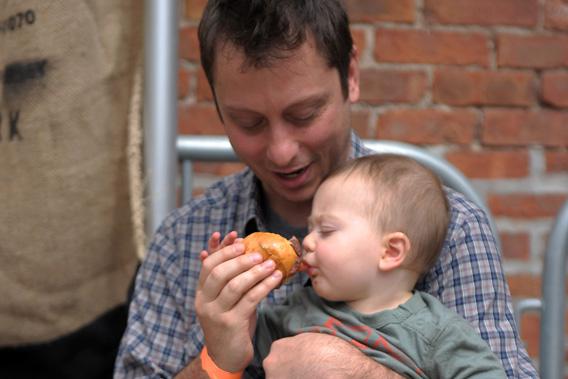If you decide you want to be hostile this Father’s Day, you have plenty of good options. You can send the man in your life a link to a 2010 Atlantic piece, “Are Fathers Necessary?” which coldly concludes that “there’s nothing objectively essential about his contribution.” Or you can point out this month’s New York Times “Room for Debate” called “What Are Fathers For?” which makes fatherhood seem like an outdated, inscrutable appliance on Antiques Roadshow. Or you can just dispense with the passive aggressive approach and give them my book, the End of Men.
But if you want to be nice, instead give the single best book on fatherhood I’ve read in a long time, Doing the Best I Can by Harvard sociologists Kathryn Edin and Timothy Nelson. The book begins by sourcing the media stereotype of the inner city “hit-and-run” dad to the aptly named Timothy McSeed, who starred in a 1986 CBS special report called “The Vanishing Family: The Crisis in Black America.” McSeed bragged on the show, “I got strong sperm,” and said he didn’t use condoms because “girls don’t like them things.” Then, when his girlfriend delivered his sixth child, footage showed him dancing around the delivery room shouting “I’m the king!” Bill Moyers won many awards for the show, and it was picked up by dozens of news outlets and the world was convinced that it understood the motivations and character of this new multiplying breed of the unwed father: vain, callous, and egomaniacal, interested in his children as trophies but not as vulnerable little beings.
In their book, Edin and Nelson go back at the McSeed caricature and pick it apart in surprising ways. The authors spent several years camping out in a two room apartment in East Camden, N.J., and following and interviewing 110 mostly unmarried white and African-American fathers there and in Philadelphia, trying to figure out what fatherhood means to them. What they found is that for these so called “deadbeat dads,” the relationship between the man and the mother of his child is usually pretty shaky, but the father-child bond is utterly central to the man’s life, so central that these dads often sound like the most sentimental of mothers. They hate the idea that they are just a paycheck, especially since they usually aren’t providing much of a steady one. (That’s what the moms are doing.) So instead “they insist that their role is to ‘be there,’” the authors observe, “to show love and spend quality time.”
Andre, one of the first fathers they talk to, is a high school kid who is delighted when he finds out his girlfriend is pregnant—delighted in a genuine, go warm all over, grin widely and thank Jesus way. “I always wanted my own child,” he tells the researchers, which surprises them. “I want to be a real father to my kids. I want to not only make a baby but I want to take care of my baby.” That he can actually do that in a sustained way is dubious. He is a teenager who doesn’t live with his father, doesn’t work, and doesn’t know anything about babies, and—like most of the men—his relationship with the mother goes south pretty quickly. But what’s undeniable is his genuine deep yearning to be a father, very different in quality than the Timothy McSeed jumping around the delivery room crowing.
In a world where the men are in a “headlong retreat” from the breadwinner aspect of fatherhood, these men have relocated their meaning and identity in the “softer ‘relational aspects’ of the role,” the authors write. They are laying claims to what used to be viewed as a “mother’s exclusive domain: love, communication and quality time.” The bond with their child—not the womanizing or the “ripping and running” or what they call the “stupid shit”—is what seems to make their lives truly worth living. Sometimes the love even spills over to other people’s children. In certain cases, when a man is wooing a woman, he pays so much attention to her kid (who has a different father) that it starts to feel to the researchers like his main goal is winning over the kid, not the mother.
The book is not an entirely heartwarming portrait of the dads. Often the men focus intensely on their children for some period of time and then give it up, because they fight with the mother or are frustrated by their inability to provide in the traditional way or because they move on to another child. Often you realize they are focusing on the “relational” aspects only because they have no other options. Or because they are trying to repair something from their own fatherless childhoods. Some of them, after all, did have fathers who were something more like McSeed, because a generation ago there wasn’t a middle class ethos of new fatherhood to emulate, and it was just more unacceptable for a man to talk so openly about his yearning for a baby.
But it’s still important to recognize that these “deadbeat dads” are not who we think they are, because Timothy McSeed is never going to get any sympathy from anyone, but a teenage boy who insists on being a “real father” just might have a shot at winning people over to help him with his predicament.
